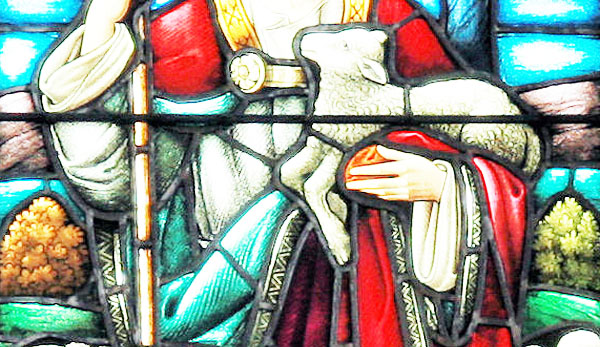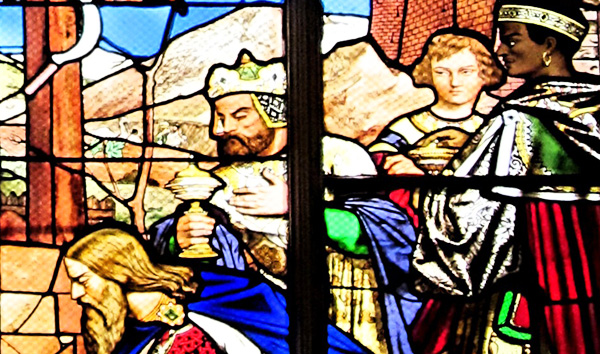I was hungry and you gave me food, I was thirsty and you gave me drink, I was a stranger and you welcomed me, I was naked and you clothed me, I was sick and you visited me, I was in prison and you came to me (Matthew 25:35-36). In Jesus’ famous description of the judgment day in Matthew 25, he describes those on his right hand (the children of God) as those who have personally ministered to Jesus in his poverty, in his sickness, and in his imprisonment.
Jesus
We Want to See Jesus
We wish to see Jesus (John 12:21). These were the words of the Greeks who approached the apostle Philip when they came to the feast at Jerusalem. It is interesting to observe that these Gentiles were seeking Jesus while the Jewish leaders were plotting to put him to death. Their appearance points to the bringing in of the Gentiles and the blessing of the gospel they would soon enjoy.
Only Jesus Keeps His Promises
I am the good shepherd. The good shepherd lays down his life for the sheep (John 10:11). How much do your worldly friends really love you? Movie or music stars you look up to? The employer who wants you to devote your life to climbing the corporate ladder? The cars, gadgets, carpet, or designer outfits you spend so much time dreaming about or delighting in?
Knowing Christ In the New Year
This is eternal life, that they know you, the only true God, and Jesus Christ whom you have sent (John 17:3). It is common, as each year begins, for people to make New Year’s resolutions … which is not a bad practice. As we look back over the past year(s), it is appropriate to wonder if we accomplished what we should have, if our life was as useful and happy as we would like it to be — and then, as a result of that assessment, we resolve to do better in areas in which we feel like we have
When They Saw the Child, They Worshiped
And going into the house, they saw the child with Mary his mother, and they fell down and worshiped him. Then, opening their treasures, they offered him gifts, gold and frankincense and myrrh (Matthew 2:11) There is a library full of lessons in this single verse of Scripture.
Why Such a Lowly Birth?
And while they were there, the time came for her to give birth. And she gave birth to her firstborn son and wrapped him in swaddling cloths and laid him in a manger, because there was no place for them in the inn (Luke 2:6-7). Jesus was born when “the time came.” The time came, not just for the fulfillment of Mary’s pregnancy, but for the fulfillment of God’s pre-world plan to become a divine human being. Think of it! The Bethlehem prophecy alone (Micah 5:2) reminds us that God had hundreds of years to plan this event! How will
The Tax That Changed the World
In those days a decree went out from Caesar Augustus that all the world should be registered (Luke 2:1). What powerful truth and what precious comfort are contained in this familiar verse! Here we see that God’s purposes are perfectly and promptly completed. Did you think that kings, or presidents, or dictators make history? No! They are but instruments in the hand of the eternal and purposeful God. Hundreds of years before, God had spoken through the prophet Micah saying:
Christ, the Power & Wisdom of God
We preach Christ crucified, a stumbling block to Jews and folly to Gentiles, but to those who are called, both Jews and Greeks, Christ the power of God and the wisdom of God. For the foolishness of God is wiser than men, and the weakness of God is stronger than men (1 Corinthians 1:23-25).
Jesus Must Reign Until…
Then comes the end, when he delivers the kingdom to God the Father after destroying every rule and every authority and power. For he must reign until he has put all his enemies under his feet. (1 Corinthians 15:24-25) Together, these two verses form one of the most encouraging and comforting pictures of reality to be found anywhere in Scripture! Every minute of time between Christ’s ascension into heaven and Christ’s triumphant return to earth is summed up here. When Jesus Christ comes again, he will have destroyed every opposing power or authority.
A Tale of Two Wisdoms
…it is not a wisdom of this age or of the rulers of this age, who are doomed to pass away. But we impart a secret and hidden wisdom of God (1 Corinthians 2:6-7). Put simply, there are two wisdoms, Paul says: human wisdom, and divine wisdom. They are not the same. They are not even similar. They are not coming to the same conclusions about God, life, priorities, joy, fulfillment, or meaning.
Your Salvation: Paid In Full
When Jesus had received the sour wine, he said, “It is finished,” and he bowed his head and gave up his spirit (John 19:30). The phrase Jesus uses here on the cross expressed a business transaction completed: “paid in full.” At the heart of trusting in Jesus Christ for salvation is the confidence that nothing else needs to be added to the price he paid, in his death, for our salvation. Do you live in the reality of a fully-paid salvation each day?
What Is Salvation, and Where Is It Found?
For by grace you have been saved through faith. And this is not your own doing; it is the gift of God (Ephesians 2:8). Salvation means “to deliver” someone out of danger. Salvation, especially in the Bible, implies then that people need to be saved. It also implies that someone is able and willing to save the person who needs to be saved. The Bible teaches that Jesus Christ is the only source of true salvation for any human being.
Jesus Says, “I Am the Door”
I am the door. If anyone enters by me, he will be saved and will go in and out and find pasture (John 10:9). It is easy and common to skip over this reference of Jesus to himself as the door and jump straight to him as the shepherd (also in this passage in John 10). But pause and consider that Jesus says he is not only the shepherd of his sheep but he is also the door. In other words, Jesus is not only the shepherd of the sheep, but he is also the way through which he leads
Location, Location, Location
There is therefore now no condemnation for those who are in Christ Jesus (Romans 8:1). There is a well-known real estate maxim that lists the three most important characteristics of any property: “Location, location, and location.” This famous real estate maxim holds true in the Bible, as well. In the Old Testament in particular leaving Israel is seen as departing from God, and returning to Israel represents one’s returning to God.
Crushed For Our Iniquities
He was pierced for our transgressions; he was crushed for our iniquities; upon him was the chastisement that brought us peace, and with his wounds we are healed (Isaiah 53:5). At the heart of the gospel — at the heart of what happened on the cross to Jesus Christ — is substitution. It is Jesus taking the place, and therefore the punishment, of sinners who deserved God’s wrath. At the cross, Jesus got what we deserved. Isaiah 53:5 gives us this clear insight into Jesus’ death.














